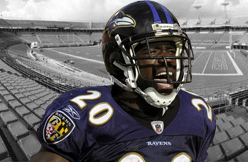Marvin Lewis has seen more of Troy Polamalu and Ed Reed than practically anybody. The Bengals coach faced both Polamalu's Steelers and Reed's Ravens twice a year for 10 seasons (then just Polamalu's for the next two years), plus a 2005 playoff loss to Pittsburgh he'd rather forget.
So, coach, which era-defining safety was better?
"Unfortunately, they’ve both had interception returns for touchdowns on us," he told Sporting News on Friday, laughing as he steered clear of answering. "Let's just say the AFC Pro Bowl team was loaded every year. They complemented each other; they really did. They were exceptional at everything. What one could do, the other could do, too."
But we love to debate the big picture. So how do the Steelers great who retired Thursday night and the Ravens star who's likely played his last game compare to the greatest safeties Lewis has ever seen?
"I think in my time, they have to be held up there with the Ronnie Lotts of the world," he said. "All the things they did, that's what Ronnie Lott did. He made plays everywhere on the field and impacted his team winning football games."
Also worthy of comparison is Rod Woodson, whom Lewis coached as defensive coordinator of the 2000 Super Bowl champion Ravens.
"The same competitive drive; the same effect on every aspect of the game,'' Lewis said. Woodson and Lott are both in the Hall of Fame.
Lewis took over the Bengals in 2003, when Polamalu was drafted and Reed was a year into his career. In the next dozen years, he faced them 40 times — 21 games against Polamalu, including the 31-17 playoff loss. Polamalu had an interception late in that game.
He saw plenty of both even before the NFL days, when each was trying to impress NFL scouts. Lewis noticed Polamalu at USC in 2003 when working out the first player he ever drafted in Cincinnati, quarterback Carson Palmer.
"Just the speed, the athleticism, the agility, the short-area change of direction, the burst, his play on the ball, it was all there," he said of Polamalu.
Lewis saw much of the same from Reed at Miami, recalling that both players started as cornerbacks and changed positions in college — a momentous decision considering the direction NFL defenses were taking in response to ever-expanding offenses.
"That’s what sets these guys apart. The NFL has evolved," Lewis said. "You need to have safeties who won’'t be out of place when they’re matched against a wide receiver. They could do it. And they had a tremendous sense of the game."
That sense was earned and learned, not just instinctive.
"The study — these guys were two cerebral players. They’re two guys who took the instruction they get from the coaches and put it into play on the field," Lewis explained. "They were guys who not only knew it, but could apply it."
Their most notable style difference was where they lined up more often: Polamalu near the line of scrimmage, where his launches into the backfield became famous; Reed in deep centerfield, chasing down passes when quarterbacks figured he'd be somewhere else.
"But they both excelled at the other," Lewis pointed out. Polamalu, the big hitter, had 32 career interceptions to go with 12 sacks and 14 forced fumbles. Reed, sixth on the all-time career interceptions list with 64, had six sacks and 11 forced fumbles.
"I can remember plays Ed made down low, and plays Troy made on the deep ball," Lewis said. "As (an opposing) coach, you try to put them in positions they’re uncomfortable in, but with them, you can’t do that. They’re going to attack every ball, everywhere."
On top of that, he added, "when they got their hands on the ball, they could run a long way with it." Reed had 14 career touchdowns; Polamalu had six.
The two combined for three Super Bowl wins (two for Polamalu), 17 Pro Bowls and nine All-Pro selections. They shared AFC Pro Bowl honors six times and first-team All-Pro twice.
Lewis, having coached against such talent for so long, won't miss Polamalu and Reed (when he too retires). But he will remember, and he does respect.
"There aren't two better players you, as a coach, would want young safeties to look up to."

(sportingnews.com)



